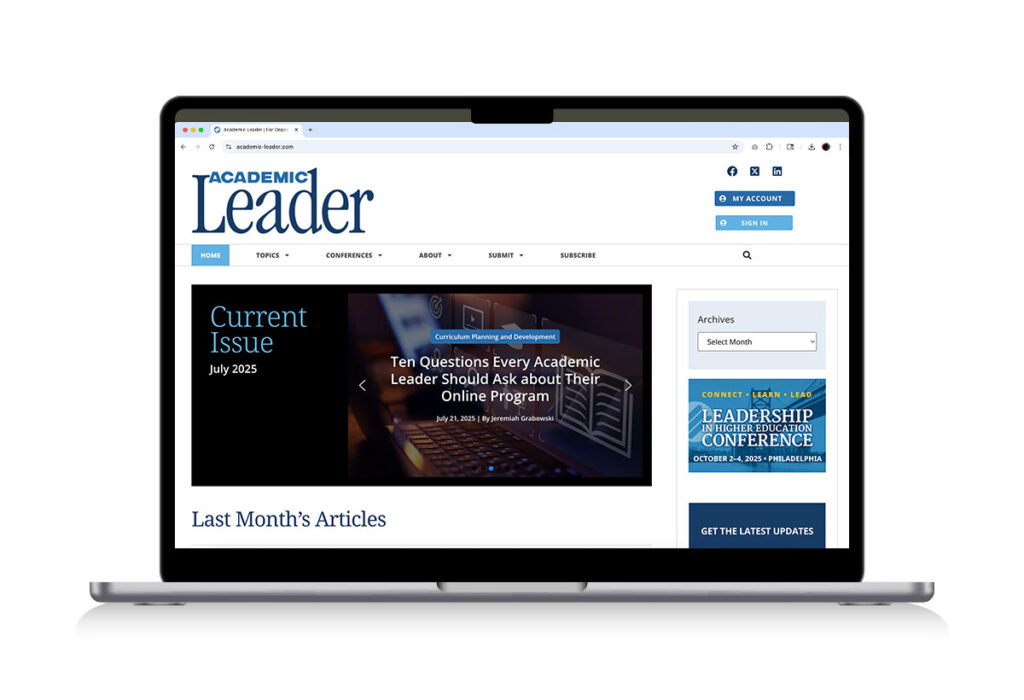Conquering the Fear of Authenticity
I will never forget the time I hired a team of social media experts to provide professional development for my fellow faculty members at a small college. As they deftly covered how to best use Facebook, Twitter, and other social media to connect with students, they suggested that it was...
Rejuvenating Experiences
The end of a long academic year is probably the time when we are most open to the idea of a rejuvenating instructional experience. In a recent workshop, I heard two teachers describe just such an experience. They team-taught an introductory English lit course with content that explored veteran experiences....
Promoting Faculty Development on a Tight Budget
In a dream world, every academic institution would be populated with a teaching and learning center coupled with a faculty enrichment meeting room. In fact, faculty would continually hone their skills as researchers and teachers in an engaged center on campus. Sounds great, right? For large institutions, probably. But for...
Chaos and Confusion: Reducing Instructional Uncertainty in Times of Crisis
“There may be times when what is most needed is, not so much a new discovery or a new idea as a difference ‘slant.’”—Owen Barfield Educators live in a constant state of disrupted comfort. Classrooms, students, curriculum, assessment, and strategies change daily. In 2020, our foundation was shaken to the...
The Role of Academic Leaders as Instructional Supervisors
When presenting at conferences, I often start by saying I have been in a classroom for 65 years. Of course, that includes my own time as a student starting at age five. Although I have not been a “student” in the formal sense for many years, I continue to learn...
Three Critical Time-Management Tips for Higher Education Professionals
Let’s face it, the life of a higher education pro is not for those without a lot of get up and go. It takes a singular mix of dedication, initiative, and creativity to balance a schedule that at any particular time can include faculty management, budgeting requirements, a research load,...
Creating an Effective Mentoring Program, Part 4: Mentorship Dos and Don’ts
Faculty mentoring programs are only as good as the mentors who work with junior faculty. Unfortunately, few senior faculty members ever receive formal training regarding how to be an effective mentor. They may be excellent instructors and researchers in their subject areas. They may also be experts on university and...
Creating an Effective Mentoring Program
This article first appeared in Academic Leader on March 17, 2017© Magna Publications. All rights reserved. Recruiting and hiring new faculty is time intensive and expensive. Despite the difficulties, hiring decisions are clearly among the most important that academic administrators ever make. Success of college programs and universities is directly correlated with...
Surviving a Leadership Transition
This article first appeared in Academic Leader on May 14, 2016 © Magna Publications. All rights reserved. Leadership changes in the upper administration can be stressful for chairs and deans. We’ve all seen situations in which a new chancellor or president arrives, and between six months and a year later, there’s an...
Transitioning from Faculty to Chair
This article first appeared in Academic Leader on November 15, 2018. © Magna Publications. All rights reserved. Many of us either are asked to serve as chair of our department as a cyclical rotating chair or have made the decision to pursue the chair position on our own. Regardless of the path...













